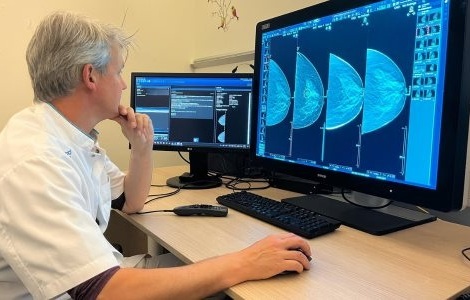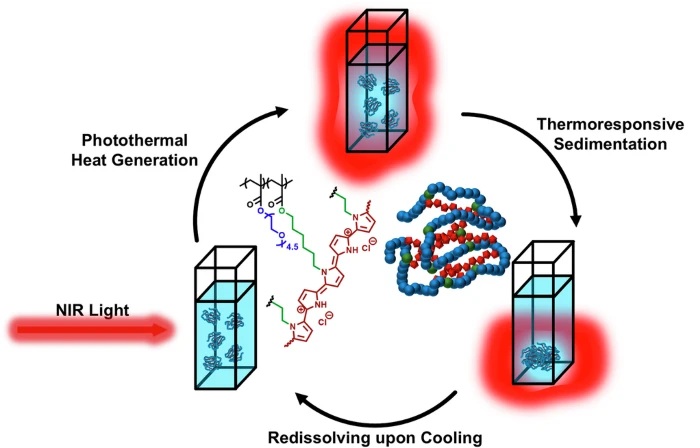ScreenPoint Medical Presents AI Application for Detecting Breast Cancer
|
By MedImaging International staff writers Posted on 28 Feb 2019 |

Image: The Transpara AI system automatically identifies soft-tissue and calcification lesions and combines the findings of all available views into a single cancer suspiciousness score (Photo courtesy of ScreenPoint Medical).
ScreenPoint Medical (Nijmegen, Netherlands) presented the latest version of its Transpara Artificial Intelligence (AI) system at ECR 2019 in Vienna.
ScreenPoint Medical develops image analysis technology for automated reading of mammograms and digital breast tomosynthesis exams, exploiting big data, deep learning and the latest developments in AI. The company’s Transpara processes 2D, 3D and combo mammography exams and is integrated in the workstations of an increasing number of OEM partners.
Utilizing state-of-the-art image analysis and deep learning technology, Transpara automatically identifies soft-tissue and calcification lesions and combines the findings of all available views into a single cancer suspiciousness score. Breast imaging professionals can use this Transpara Score to automatically identify exams that are highly likely to be normal and the exams with features indicating highly increased risk of cancer. Interactive decision support is provided to improve assessment of lesions. Information is provided concurrent during reading and only when needed, as a result of which, it does not slow down reading.
Transpara is the first AI application for detecting breast cancer in screening mammograms to gain 510(k) Clearance from the FDA, based on its unique functionality, which interactively provides support for detection and diagnosis. The clearance was supported by the results of a multi-reader, multi-case Reader Study, which demonstrated that radiologists significantly improved detection accuracy when using Transpara for decision support without increasing reading times. In the study, the stand-alone sensitivity and specificity of Transpara was nearly at the same level as that of radiologists.
ScreenPoint Medical develops image analysis technology for automated reading of mammograms and digital breast tomosynthesis exams, exploiting big data, deep learning and the latest developments in AI. The company’s Transpara processes 2D, 3D and combo mammography exams and is integrated in the workstations of an increasing number of OEM partners.
Utilizing state-of-the-art image analysis and deep learning technology, Transpara automatically identifies soft-tissue and calcification lesions and combines the findings of all available views into a single cancer suspiciousness score. Breast imaging professionals can use this Transpara Score to automatically identify exams that are highly likely to be normal and the exams with features indicating highly increased risk of cancer. Interactive decision support is provided to improve assessment of lesions. Information is provided concurrent during reading and only when needed, as a result of which, it does not slow down reading.
Transpara is the first AI application for detecting breast cancer in screening mammograms to gain 510(k) Clearance from the FDA, based on its unique functionality, which interactively provides support for detection and diagnosis. The clearance was supported by the results of a multi-reader, multi-case Reader Study, which demonstrated that radiologists significantly improved detection accuracy when using Transpara for decision support without increasing reading times. In the study, the stand-alone sensitivity and specificity of Transpara was nearly at the same level as that of radiologists.
Latest ECR 2019 News
- PaxeraHealth Showcases Advanced Image Sharing Platform at ECR
- iCAD Presents Latest AI Solution for Digital Breast Tomosynthesis
- Philips Introduces Software to Support Diagnostic Confidence
- Canon Medical Systems Showcases Wide Product Lineup in Vienna
- Radcal Demonstrates New Stand-Alone System at Imaging Trade Fair
- Fujifilm Medical Systems Europe Highlights AI Initiative in Austria
- SuperSonic Imagine Introduces Ultrasound System at ECR
- Esaote Presents Latest Ultrasound Technologies and AI-based Solutions at ECR
- Agfa HealthCare Demonstrates Enterprise Imaging and DR at ECR Trade Show
- Carestream Health Exhibits Advanced Imaging and IT Platforms in Austria
- Guerbet Displays New Multi-Use Injector at ECR 2019
- Shimadzu Europa Demonstrates Diagnostic Imaging and Analytical Technologies
- Barco Presents Latest Displays at 2019 European Congress of Radiology
- EIZO Presents New Radiological Monitor Solutions at Vienna Trade Fair
- Konica Minolta Presents Mobile Innovations at ECR
Channels
Radiography
view channel
X-Ray Breakthrough Captures Three Image-Contrast Types in Single Shot
Detecting early-stage cancer or subtle changes deep inside tissues has long challenged conventional X-ray systems, which rely only on how structures absorb radiation. This limitation keeps many microstructural... Read more
AI Generates Future Knee X-Rays to Predict Osteoarthritis Progression Risk
Osteoarthritis, a degenerative joint disease affecting over 500 million people worldwide, is the leading cause of disability among older adults. Current diagnostic tools allow doctors to assess damage... Read moreMRI
view channel
Novel Imaging Approach to Improve Treatment for Spinal Cord Injuries
Vascular dysfunction in the spinal cord contributes to multiple neurological conditions, including traumatic injuries and degenerative cervical myelopathy, where reduced blood flow can lead to progressive... Read more
AI-Assisted Model Enhances MRI Heart Scans
A cardiac MRI can reveal critical information about the heart’s function and any abnormalities, but traditional scans take 30 to 90 minutes and often suffer from poor image quality due to patient movement.... Read more
AI Model Outperforms Doctors at Identifying Patients Most At-Risk of Cardiac Arrest
Hypertrophic cardiomyopathy is one of the most common inherited heart conditions and a leading cause of sudden cardiac death in young individuals and athletes. While many patients live normal lives, some... Read moreUltrasound
view channel
Wearable Ultrasound Imaging System to Enable Real-Time Disease Monitoring
Chronic conditions such as hypertension and heart failure require close monitoring, yet today’s ultrasound imaging is largely confined to hospitals and short, episodic scans. This reactive model limits... Read more
Ultrasound Technique Visualizes Deep Blood Vessels in 3D Without Contrast Agents
Producing clear 3D images of deep blood vessels has long been difficult without relying on contrast agents, CT scans, or MRI. Standard ultrasound typically provides only 2D cross-sections, limiting clinicians’... Read moreNuclear Medicine
view channel
PET Imaging of Inflammation Predicts Recovery and Guides Therapy After Heart Attack
Acute myocardial infarction can trigger lasting heart damage, yet clinicians still lack reliable tools to identify which patients will regain function and which may develop heart failure.... Read more
Radiotheranostic Approach Detects, Kills and Reprograms Aggressive Cancers
Aggressive cancers such as osteosarcoma and glioblastoma often resist standard therapies, thrive in hostile tumor environments, and recur despite surgery, radiation, or chemotherapy. These tumors also... Read more
New Imaging Solution Improves Survival for Patients with Recurring Prostate Cancer
Detecting recurrent prostate cancer remains one of the most difficult challenges in oncology, as standard imaging methods such as bone scans and CT scans often fail to accurately locate small or early-stage tumors.... Read moreGeneral/Advanced Imaging
view channel
New Algorithm Dramatically Speeds Up Stroke Detection Scans
When patients arrive at emergency rooms with stroke symptoms, clinicians must rapidly determine whether the cause is a blood clot or a brain bleed, as treatment decisions depend on this distinction.... Read more
3D Scanning Approach Enables Ultra-Precise Brain Surgery
Precise navigation is critical in neurosurgery, yet even small alignment errors can affect outcomes when operating deep within the brain. A new 3D surface-scanning approach now provides a radiation-free... Read moreImaging IT
view channel
New Google Cloud Medical Imaging Suite Makes Imaging Healthcare Data More Accessible
Medical imaging is a critical tool used to diagnose patients, and there are billions of medical images scanned globally each year. Imaging data accounts for about 90% of all healthcare data1 and, until... Read more
Global AI in Medical Diagnostics Market to Be Driven by Demand for Image Recognition in Radiology
The global artificial intelligence (AI) in medical diagnostics market is expanding with early disease detection being one of its key applications and image recognition becoming a compelling consumer proposition... Read moreIndustry News
view channel
GE HealthCare and NVIDIA Collaboration to Reimagine Diagnostic Imaging
GE HealthCare (Chicago, IL, USA) has entered into a collaboration with NVIDIA (Santa Clara, CA, USA), expanding the existing relationship between the two companies to focus on pioneering innovation in... Read more
Patient-Specific 3D-Printed Phantoms Transform CT Imaging
New research has highlighted how anatomically precise, patient-specific 3D-printed phantoms are proving to be scalable, cost-effective, and efficient tools in the development of new CT scan algorithms... Read more
Siemens and Sectra Collaborate on Enhancing Radiology Workflows
Siemens Healthineers (Forchheim, Germany) and Sectra (Linköping, Sweden) have entered into a collaboration aimed at enhancing radiologists' diagnostic capabilities and, in turn, improving patient care... Read more






















